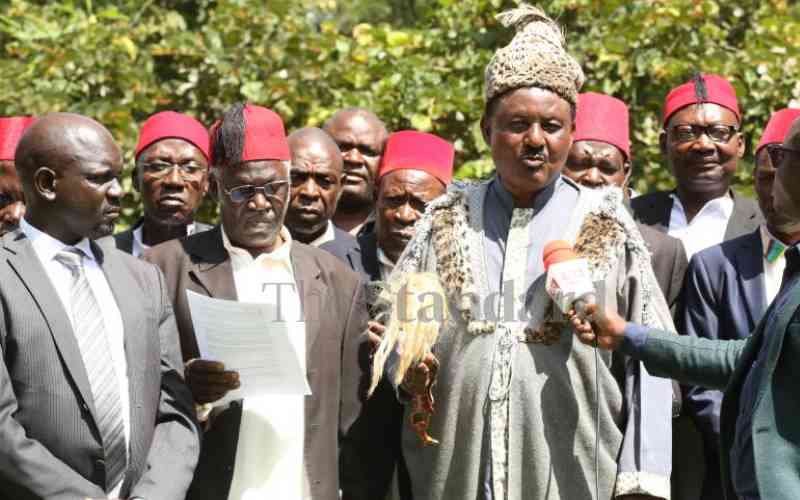George Nyabuga
Kenya media operate in a highly competitive commercial, and sometimes difficult political environment. Despite this fact, they remain very vibrant and have been in the forefront of advancing the interests of Kenyans.
Sometimes they may even be considered the real ‘opposition’ owing to the fact that some political elites advance their own interests at the expense of those they claim to represent. As such, we have seen the media lead the battle against, for example, some extreme legislations like that meant to attack hard-earned press freedom. Granted, this was done in self-interest. But there are others where journalism has done quite well, giving Kenyans the platform to engage in debate, and, to use the now clichÈd terminology, set the agenda. Kenya’s media have undoubtedly made significant contribution to various issues, ranging from Mau, the Constitution, battle against impunity, corruption, pillaging of free primary education money and other funds, hunger, road carnage, among others. In effect, Kenyans would have remained largely ignorant were it not for the media.
However, a critical introspection sometimes reveals the failures within the media, particularly when it panders to populist ideas, or contributes to societal malaise through publication of information that is sometimes harmful.
Yet such thinking assumes that media have effects, and that only journalism is to blame for the malaise that afflicts society, and that the media should always be more selective in their coverage or publication of issues and events.
It is noteworthy that media cater for disparate interests and consumer needs, covering both serious or ‘real’ issues, and the less-serious human-interest, ‘softer’ and ‘lighter’ stories.
In the difficult task of giving the public what it is interested in, or stories of public interest, the media may sometimes be accused of dumbing down, preferring entertainment, covering ‘juicier’ at the expense of more ‘serious’ issues that affect the State. Accordingly, it has become almost inevitable to incorporate more unusual, satirical, ‘softer’ and ‘lighter’ stories alongside what some may consider ‘real’, hard and serious news lest it marginalises those that want the ‘human interest’ articles.
Despite the above arguments, however, 2010 will be a challenging but defining year for the media. The number of issues awaiting Kenyans this year means journalists in the country have to be ready to offer serious, impartial and balanced coverage, to be ready to become the public sphere that it ought to be. The coverage of some emotive issues like the conservation of the Mau through evictions, the constitutional debate and attendant referendum, the anticipated trial of the masterminds of the 2007/2008 post-election violence among others will define the independence and vibrancy of journalism in Kenya.
Although I can vouch for the vibrancy of the media, there are sometimes attempts to use the media to advance vested interests. This is something the media are always alive to, and an issue journalists have to deal with every day.
The elite in society have found another way of dealing with the media — the courts. In the recent past, some political and other elite have managed to get gagging orders, preventing them from ‘touching’ issues that affect their performance even when they occupy key public positions that should be subject to media and public scrutiny.
What is more, some organisations and individuals often threaten to withhold advertising support in the hope of pressuring the media to drop investigations into some shady activities they are involved in.
Others have gone as far as trying to apply informal pressures, including threats and violence against journalists in the hope that such tactics would prevent them from performing their duties. That such application of formal and informal pressures will continue this year is not in doubt.
At the same time, however, there is little doubt that Kenyans will continue to support the media especially at this defining moment in Kenya’s history.
At a time when most people rely on the media for information, it will be a failure to capitulate to people and organisations intent on using the media to advance their own interests, or to scamper when threatened with violence, court orders, or threats to withhold advertising support.
In effect, 2010 will be a year when journalists have to prove that they have the capacity to survive economic, political pressures and personal threats, and that they can articulate issues of great public interest without fear or favour.
Stay informed. Subscribe to our newsletter
Dr Nyabuga is the Managing Editor, Weekend Editions and Media Convergence. [email protected]
 The Standard Group Plc is a
multi-media organization with investments in media platforms spanning newspaper
print operations, television, radio broadcasting, digital and online services. The
Standard Group is recognized as a leading multi-media house in Kenya with a key
influence in matters of national and international interest.
The Standard Group Plc is a
multi-media organization with investments in media platforms spanning newspaper
print operations, television, radio broadcasting, digital and online services. The
Standard Group is recognized as a leading multi-media house in Kenya with a key
influence in matters of national and international interest.
 The Standard Group Plc is a
multi-media organization with investments in media platforms spanning newspaper
print operations, television, radio broadcasting, digital and online services. The
Standard Group is recognized as a leading multi-media house in Kenya with a key
influence in matters of national and international interest.
The Standard Group Plc is a
multi-media organization with investments in media platforms spanning newspaper
print operations, television, radio broadcasting, digital and online services. The
Standard Group is recognized as a leading multi-media house in Kenya with a key
influence in matters of national and international interest.









